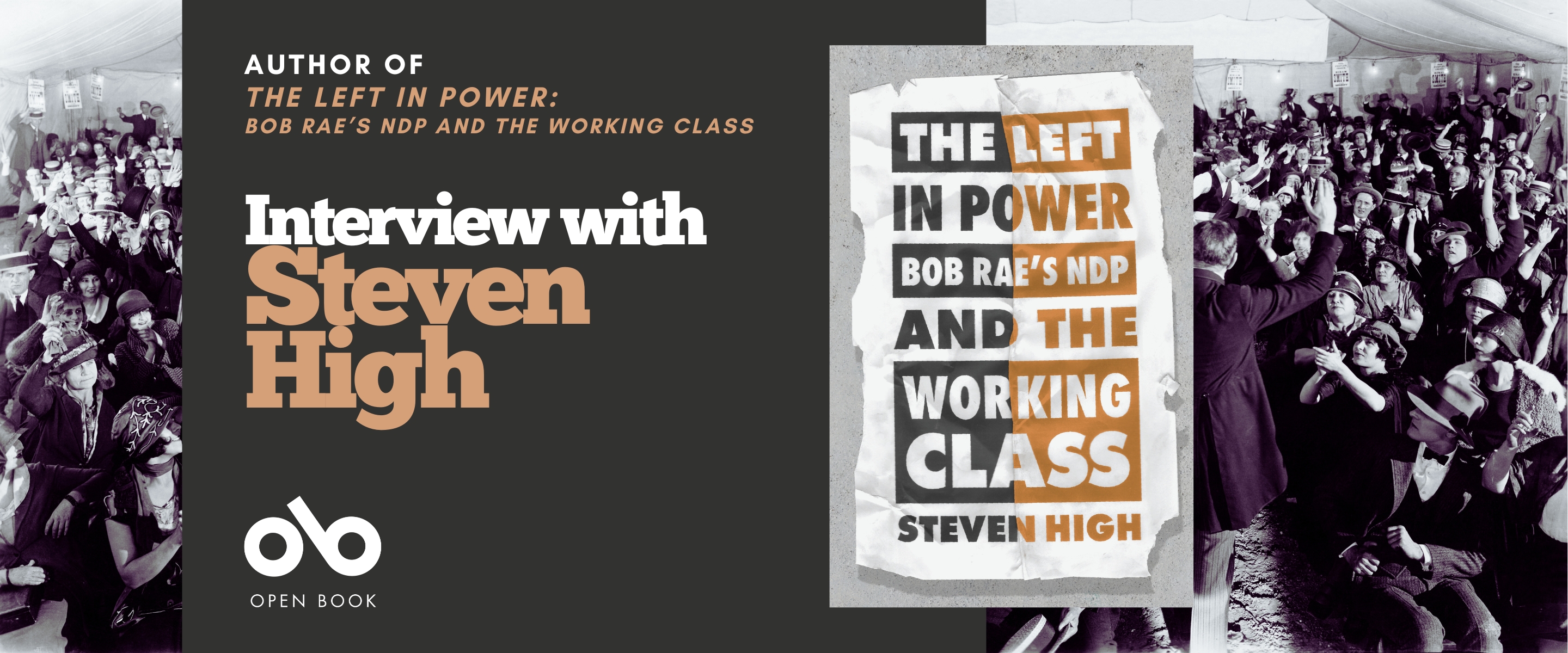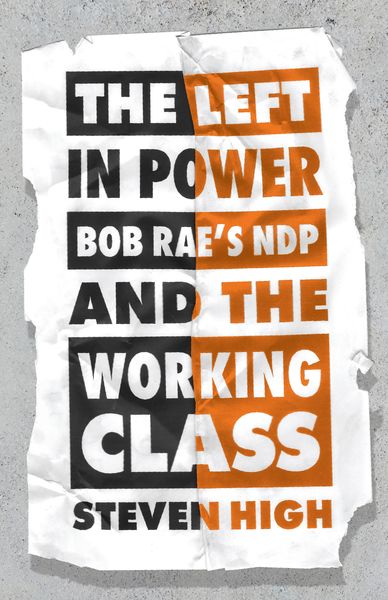Historian Steven High Unpacks the Surprising Early-Nineties Triumph and Collapse of Bob Rae's NDP
As the current political climate in North America continues to shift and evolve, there have been clear signs that the dominant forms of conservatism and liberalism from the late 20th century are finding dwindling support. Often seen as the "lesser of two evils" by those on the left, modern liberalism and the neoliberal tenets that were adopted to deal with the deindustrialization of many democratic nations are failing to connect with many left-wingers who are looking for effective progressive governance.
In order to understand how this has happened, historian Steven High explores one very specific moment in time where a leftist government took significant and unexpected power. His focus is the 1990 victory of Bob Rae's Ontario NDP party, which began as a hopeful movement toward a different kind of liberalism, focused more firmly on the working-class and socialist ideals, but it was a government that ultimately ended up making policy shifts that left their base feeling betrayed and ignored yet again.
High takes a close look at this piece of Ontarian history in The Left in Power: Bob Rae's NDP and the Working Class (Between the Lines Press), and explores the lessons that might be learned about governing on the left by studying this dramatic rise and fall from one particular political party trying to redefine itself. It's a timely work of nonfiction that unpacks this period using extensive research and insight from the very politicians, advisors, and experts that watched these events unfold.
Check out this True Story Nonfiction Interview with the author, and find out more about the inspiration for the book, and the significance of this era in our national history.
Open Book:
Tell us about your new book and how it came to be. What made you passionate about the subject matter you're exploring?
Steven High:
I am very interested in understanding how we politically came to be where we are today. Few would disagree that it is a time of ideological polarization and anger. Right-wing populism is ascendant around the world. In part, this seems to be a reaction to neoliberal globalization and the ways that working-class people were left behind economically. Donald Trump’s promise to bring manufacturing jobs home helped him win the Rust Belt states. Progressive parties seem to have lost the ear of working-class voters. My new book invites us to consider the part played by the failure of the political left to effectively respond to the crashing end of the post-war boom.
Bob Rae’s unexpected September 1990 victory in Ontario, which includes much of Canada’s industrial heartland, is thus a valuable window into this political pivot. The Soviet Bloc had just collapsed and global capitalism seemed triumphant. The onset of trade liberalization and free trade with the US and Mexico were radically restructuring Ontario’s economy, displacing 300,000 Ontario manufacturing workers between 1989-1992. How did the Rae government respond to this transition towards the “new global economy”? How did it try to ensure that the economic burden of this transition was shared? These are essential questions going forward as the world transitions away from fossil fuels for our own planetary survival. We can therefore learn much from the dismal failure of past efforts to forge a just transition.
OB:
Is there a question that is central to your book? And if so, is it the same question you were thinking about when you started writing or did it change during the writing process?
SH:
The central question that I ask is how did the Ontario NDP respond to the worst economic crisis to hit the province since the Great Depression?
Your CanLit News
Subscribe to Open Book’s newsletter to get local book events, literary content, writing tips, and more in your inbox
When I interviewed Bob Rae, now Canada’s ambassador to the United Nations, we agreed that the Ontario NDP government was a transitional moment for the social-democratic left. The old economic nationalism that supported state intervention in the economy, through nationalization and central state planning, was on the wane and the “third way” politics of Tony Blair and Bill Clinton in the second half of the 1990s, with their shift away from class politics towards a more consensual politics of citizenship and community, was not yet a reality. My book shows how we can see this ideological pivot over the five years that the Ontario NDP was in power.
The Rae government had run on the old redistributive class politics and initially sought to defend industrial jobs. The government saved Algoma Steel in Sault-Ste-Marie from closing, facilitating a worker buyout with the help of the United Steelworkers union. It still operates today. The same was true of the paper mill in Kapuskasing and Toronto’s aeronautics industry. Had any other party been in power in the early 1990s, it is doubtful that these industries would have survived. The government also experimented with encouraging labour and management to collaborate on a new industrial policy and on worker retraining. As someone originally from Northern Ontario, I can say that the Rae government made a real difference to my home region.
However, as the economic crisis turned into a fiscal crisis, the government pivoted away from fighting the recession to fighting the deficit. Cutting expenditures became the over-riding concern. The 1993 Social Contract, which forcibly opened collective agreements and imposed austerity on public sector unions, effectively exploded the government’s relationship with most trade unions. Billions of dollars were saved but at a huge political price for the government.
OB:
What was your research process like for this book? Did you encounter anything unexpected while you were researching?
SH:
The book is based on extensive archival and oral history research. As thirty years have passed by since the government was voted out, many files are now open to researchers. I was also thankful that several key cabinet ministers, including Premier Bob Rae and Finance Minister Floyd Laughren, had deposited their papers. I also benefitted from union archives as the book is also about the trade union movement and its relationship to the government. The Ontario NDP records were also essential, revealing the extent to which party members were disillusioned by the government, as membership plummeted and unions disaffiliated. The party was even forced to lay-off staff members. While these records were essential, I also conducted twenty interviews with key figures in the government including cabinet ministers such as Frances Lankin, Rae and Laughren as well as senior policy advisors. Their recollections helped me understand the decisions made as well as the ideological pivot within international social-democracy. Several, for example, spoke of how the political U-Turn of the French Socialist government in the early 1980s, which turned away from nationalization and state planning, influenced their thinking.
OB:
What do you love about writing nonfiction? What are some of the strengths of the genre, in your opinion?
SH:
As an oral historian, my writing is grounded in real people. We can learn much from asking people about what they experienced. I did not always agree with the interpretation of those that I interviewed for this book, but I came away with a much better understanding of what they went through and why they made the choices that they did. It is a very human story – of people learning to govern on the fly at the most difficult of moments. Almost everyone spoke of how much of their days in government was spent “firefighting”, putting out the economic wildfires breaking out across the province. Too often politics is approached from a birds-eye view and abstracted. My book is different that way.
OB:
What do you need in order to write – in terms of space, food, rituals, writing instruments?
SH:
My last book, Deindustrializing Montreal: Entangled Histories of Race, Residence and Class, which looked at two adjoining neighbourhoods, one white and the other racialized, took nearly 15 years to write. It came together slowly. My new book, by contrast, took only four years to research and write. This is light-speed for an academic historian. Much of my writing occurred in the early morning from 4am to 9am. I’m not an early riser by choice, but as the father of a severely disabled daughter, my shifts are different than others. My father, a railway worker in Thunder Bay, worked the night shift until I was sixteen. So shift work is something I understand. I have also learned to write in short bursts, given my family responsibilities.
OB:
Do you remember the first moment you began to consider writing this book? Was there an inciting incident that kicked off the process for you?
SH:
Historians like to put distance between our selves and those we study. Not so here. This is my most personal book to date. I was once active in the Ontario NDP, serving on the provincial executive as a youth representative. It was the late 1980s, and so have a deep understanding of the party on the eve of its election. I am no insider to the government however as I pivoted away from politics in graduate school. In fact, I was one of the multitude who quit the Ontario NDP out of disillusionment. My writing this book was therefore an opportunity to make sense of this moment in my life as well as that of the country’s. I learned a lot – there was much I did not know or understand at the time. There is considerable value in this kind of open-minded revisiting in my opinion.
OB:
What are you working on now?
SH:
My next book will be a global history of capitalism in the late 20th century as where things are made shifted from Europe and North America to Asia. Trade liberalization brought with it intense competition that worked to lower wages, undermine unions, and undermine progressive tax systems. The rule of the billionaires that we see today is a direct result of this. This idea grew out of my research on the Bob Rae government, which revealed the extent to which a jurisdiction’s so-called “business climate” served to limit the policy options on the table. This is a fundamental threat to democratic governance.
_______________________________________
Steven High is a professor of history at Concordia University in Montreal where he co-founded the Centre for Oral History and Digital Storytelling. He has authored a number of books and articles on structural and mass violence as well as deindustrialization as a political, socio-economic, and cultural process. He is currently the head of the transnational “Deindustrialization and the Politics of Our Time” (DEPOT) research project which brings together researchers, museum professionals, archivists, and trade unionists across Europe and North America.







